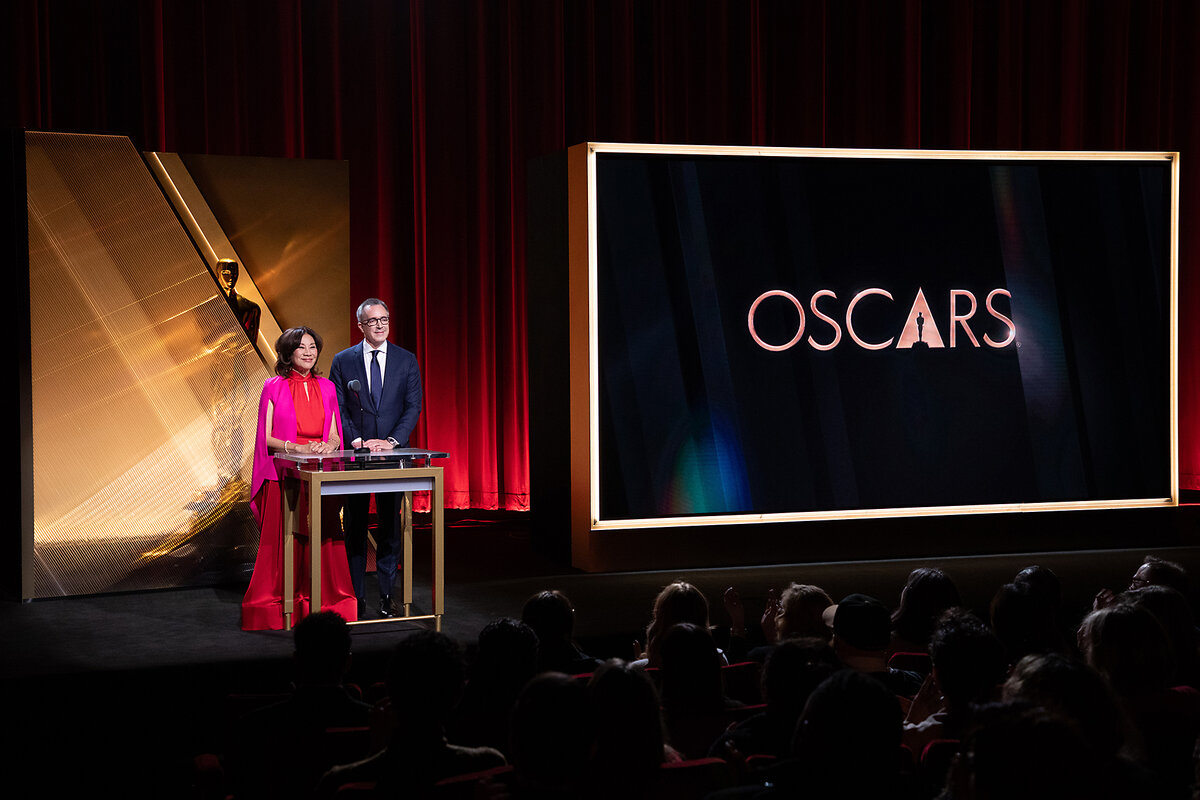After LA fires, the Oscars decreed the show must go on. Here’s why.
Loading...
Despite the obliteration of entire Los Angeles neighborhoods, the Academy Awards decided the show must go on. A tone-deaf response to a devastating disaster? The Oscars had already been facing criticisms for being out of touch. As one magazine writer put it, “While the press is seriously impressed by the awards and the industry makes a pretense of regarding them as important, they do not mean so much today as they once did.”
Those words were written in 1938. That year, historic flooding wiped out bridges, roads, and farmlands in Los Angeles County. It killed over 100 people. The Oscars were delayed by a week. Yet, according to a recounting by Stage magazine, which included the comment above, the lavish awards banquet was a celebratory affair. There’s no historical record of anyone mentioning the floods in their acceptance speeches.
This year’s Oscars are also taking place soon after a Los Angeles cataclysm. But unlike the 1938 ceremony, these awards will be televised. The Academy of Motion Picture Arts and Sciences has pledged that its March 2 broadcast will showcase the “beauty and resilience” of Los Angeles following wildfires that killed 29 people. The question is whether the Oscars can simultaneously indulge in its usual ostentatious glitz. It risks coming across as Hollywood royalty insulated in its own Versailles (with Dolby Sound). They don’t want to be caricatured as seeming out of touch – “Let them eat popcorn” – while thousands remain displaced. However, if the ceremony focuses on its greater community beyond superficial platitudes, the Oscars could connect with everyday Americans in a way that it hasn’t in a while.
Why We Wrote This
A story focused onHow do you calibrate an Oscars ceremony after a natural disaster? Other award shows are balancing the glitz with compassion – which is resonating at a time when Los Angeles is rebuilding.
“Thinking about awards is very hard right now,” says Debra Birnbaum, editor-in-chief of GoldDerby.com. “Hollywood is often accused of being self-congratulatory. But meanwhile, you’re talking about an industry town that’s decimated and heartbroken. ... Entire communities were wiped out.”
Honoring first responders and Watch Duty
The lyrics of Bertolt Brecht’s “Hollywood Elegies” includes an oft-quoted observation about Los Angeles: “It’s Hell, it’s Heaven: the amount you earn / Determines if you play the harp or burn.”
The lines takes on a fresh resonance in the wake of January’s infernos. Those in the most exclusive 9012-something ZIP codes were mostly spared. Mostly. Malibu beachfront properties are now just a scorched seashore. Swatches of the Pacific Palisades, an affluent area, were razed. By contrast, Altadena was an attractive area prized for its affordability. The Eaton Fire wiped out 9,000 homes and buildings. Affected residents include Hollywood prop masters, dolly grip operators, and gaffers. In other words, the crew members whose names scroll through the end credits long after most moviegoers have exited the theater.
That’s why the first ceremony of the 2025 awards season tore up its script. American Cinematheque’s Tribute to the Crafts was cognizant that many of its honorees in fields such as choreography, cinematography, and costume lived in fire-ravaged areas. So, American Cinematheque pledged donations to the California Fire Foundation. It bestowed its Unsung Hero Award on John Mills, CEO of Watch Duty, an app that became a must-have tool for tracking the path of the wildfires. Mr. Mills invited firefighters to the Jan. 24 gala, as a reminder that Hollywood’s true heroes aren’t actors dangling from a harness in front of a green screen. As the first, the ceremony set a template for others to follow, says Pete Hammond, awards columnist for Deadline.
Sure enough, on Feb. 6 the CEO of the American Film Institute Awards paid tribute to firefighters. Actor Kristen Bell brought a first responder to the AFI Awards as her guest. (Ms. Bell was one of several celebrities who have been volunteering at donation centers.) At the Grammys, fire captains presented album of the year to Beyoncé. The televised music ceremony also included a telethon that raised nearly $9 million. Plus, it set aside ad space for small businesses, such as a florist in Altadena and skateboard shop in the Palisades, that had been devastated by the wildfires. One reason ceremonies haven’t been cancelled is because they’re so important to caterers, limousine services, hotels, and numerous other local firms.
“You don’t want to destroy your economy more than ... already with these natural disasters,” says Mr. Hammond. “So the calmer heads prevailed and they said, ‘Let’s find a way to merge both.’”
The entertainment industry is making such a show of venerating non-celebrities that the Critics Choice Awards decided to forgo a televised red carpet show this year. Will the Oscars follow suit? In a normal year, Hollywood’s top echelon swan down the red carpet in Valentino, Versace, and Vera Wang. The glamour is the whole point. It’s about selling the Hollywood Dream. A big part of that is allowing winners to bask in the spotlight while they thank the Academy, their agent, and that fifth grade teacher who spotted their early promise. However, the Oscars mean far less than they did in 2008, let alone 1938. Younger generations are far more interested in TikTok creators who look like the person who lives next door.
“I can relate to that person,” says entertainment business analyst Bob Lefsetz, author of the influential Lefsetz newsletter. “I can’t relate to the person in the movies who won the genetic lottery. Incredibly good looking. They’re not that talented. ... They’re selling perfume.”
Mr. Lefsetz adds that, in our Tower of Babel culture, movies are no longer a dominant medium. The vast majority of people haven’t seen this year’s 10 best picture nominees apart from, perhaps, blockbusters “Dune: Part Two” and “Wicked.” Academy Awards viewership has declined from 43.7 million in 2014 to 19.5 million in 2024.
Hollywood may have ceded cultural share to video games and social media. But the wildfires afford the 97th Academy Awards an opportunity to step outside the velvet rope and display a common touch. It did so during the recent pandemic, when the Oscars radically downscaled for a subdued and socially distanced event. There are other precedents, too.
“After Pearl Harbor, the Academy canceled the Oscar banquet because it seemed unseemly to have a glitzy banquet with America going to war,” says Michael Schulman, author of “Oscar Wars: A History of Hollywood in Gold, Sweat, and Tears.” “Then they un-canceled the banquet, but told people not to dress up too much. ... In the end it was a ceremony with Allied flags and Jimmy Stewart and other people in military uniform.”
“An outpouring of love”
Following the attacks of Sept. 11, 2001, the Oscars featured a first-time appearance at the ceremony by Woody Allen to introduce a montage of New York in the movies.
“I think maybe there’ll be something similar like that this year about Los Angeles as a movie town,” says Mr. Schulman, who is a writer for The New Yorker.
He doubts that the awards will highlight the numerous famous people whose homes burned down in the fire. Four of the 55 member Academy board of governors were also among those who lost homes, including the visual effects governor and animation branch governor. Host Conan O’Brien has told interviewers that his writers are still gauging the mood of Los Angeles. They don’t want to come across as too flippant.
“There’s a misconception sometimes that, ‘Oh, some rich people lost their homes,’” said Mr. O’Brien, whose podcast co-host and assistant lost her house in the blaze, in an interview with ABC. “This is something that touched everybody, regardless of your income.”
Ultimately, this year’s awards will celebrate joy and hope, says Gold Derby’s Ms. Birnbaum.
“I know Hollywood gets a bad rap,” she says. “But what I really felt in the last two weeks, and the last month, is an outpouring of love from around the country. I think this show will reflect that.”







